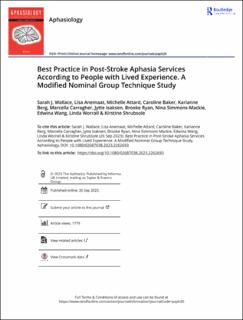| dc.contributor.author | Wallace, Sarah J. | |
| dc.contributor.author | Anemaat, Lisa | |
| dc.contributor.author | Attard, Michelle | |
| dc.contributor.author | Baker, Caroline | |
| dc.contributor.author | Berg, Karianne | |
| dc.contributor.author | Carragher, Marcella | |
| dc.contributor.author | Isaksen, Jytte | |
| dc.contributor.author | Ryan, Brooke | |
| dc.contributor.author | Simmons-Mackie, Nina | |
| dc.contributor.author | Wang, Edwina | |
| dc.contributor.author | Worrall, Linda | |
| dc.contributor.author | Shrubsole, Kirstine | |
| dc.date.accessioned | 2024-03-26T13:33:01Z | |
| dc.date.available | 2024-03-26T13:33:01Z | |
| dc.date.created | 2023-09-29T11:31:03Z | |
| dc.date.issued | 2023 | |
| dc.identifier.citation | Wallace, S. J., Anemaat, L., Attard, M., Baker, C., Berg, K., Carragher, M., Isaksen, J., Ryan, B., Simmons-Mackie, N., Wang, E., Worrall, L. & Shrubsole, K. (2023). Best practice in post-stroke aphasia services according to people with lived experience. A modified nominal group technique study. Aphasiology. doi: | en_US |
| dc.identifier.issn | 1464-5041 | |
| dc.identifier.uri | https://hdl.handle.net/11250/3124259 | |
| dc.description.abstract | Background: Clinical practice guidelines and best practice statements aim to optimise patient outcomes through recommended processes of care. The Aphasia United Best Practice Recommendations were developed to provide multi-national best-practice guidance for post-stroke aphasia services. The recommendations were developed through a multi-stage process which synthesised research evidence and the expert opinions of clinicians and researchers. To date, however, people with lived experience of aphasia have not contributed their expertise to these recommendations. Aims: To explore the relevance, comprehensibility, and comprehensiveness of the Aphasia United Best Practice Recommendations, from the perspective of people with aphasia and their significant others. Conducted during the COVID-19 pandemic, a secondary aim was to evaluate participants’ satisfaction with videoconferencing for research. Methods & Procedures: People with aphasia and their significant others participated in separate focus groups via videoconferencing. Participants were recruited at five Australian sites (representing major cities and regional locations). Participants rated the relevance and comprehensibility (clarity) of the recommendations and suggested improvements. Using the nominal group technique, participants assessed the comprehensiveness of the existing recommendations, and generated and prioritised new items for inclusion. These recommendations were synthesised across groups using qualitative content analysis. Participants rated their satisfaction with videoconferencing for research through a bespoke questionnaire. Outcomes & Results: People with aphasia (n=13) and their significant others (n=10) participated in one of eight focus groups in Australia. Most participants rated the existing recommendations as highly relevant, however improvements to comprehensibility and comprehensiveness were suggested. Fifty-one new recommendations were prioritised and synthesised into seven themes for people with aphasia and six themes for significant others. The most highly ranked theme for people with aphasia was, Increased awareness about: what aphasia is, the impacts of aphasia, and how to communicate with a person with aphasia. The theme ranked most highly by significant others was, Aphasia services should be person and family centred. All participants reported being satisfied or highly satisfied with the use of Zoom videoconferencing for research. Conclusions: People with aphasia and their significant others in Australia identified new important best practice recommendations for aphasia services. The results of this study suggest that revisions to existing recommendations may improve their relevance, comprehensibility, and comprehensiveness. Participants were satisfied with the use of videoconferencing for research. The results of this research will inform a future consensus process to finalise the revised recommendations and to pair them with measurable quality indicators for post-stroke aphasia services. | en_US |
| dc.language.iso | eng | en_US |
| dc.publisher | Taylor & Francis | en_US |
| dc.rights | Navngivelse 4.0 Internasjonal | * |
| dc.rights.uri | http://creativecommons.org/licenses/by/4.0/deed.no | * |
| dc.title | Best practice in post-stroke aphasia services according to people with lived experience. A modified nominal group technique study | en_US |
| dc.type | Peer reviewed | en_US |
| dc.type | Journal article | en_US |
| dc.description.version | publishedVersion | en_US |
| dc.rights.holder | © 2023 The Author(s) | en_US |
| dc.source.pagenumber | 23 | en_US |
| dc.source.journal | Aphasiology | en_US |
| dc.identifier.doi | 10.1080/02687038.2023.2262693 | |
| dc.identifier.cristin | 2180252 | |

